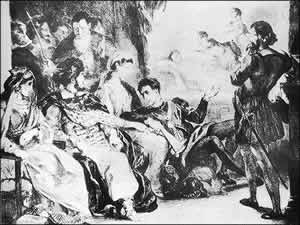![]()
The Questions Posed
 |
|
I
have heard |
Fearing that the apparition he saw in Act I may be a demonic deception capitalizing on the mental vulnerability created by his "weakness and ... melancholy," Hamlet devises a trap to test its voracity. His stated intention in organizing the mousetrap scene is to have more conclusive proof of Claudius' guilt. This test seems to pop into Hamlet's active mind from the moment the players arrive in Act II. By the end of act, it seems to be fully devised, and Hamlet has already arranged to have a speech inserted in the play for the following night, which, presumably, will play a significant role in activating the king's conscience. Many of the ingredients essential to this plan as laid out at the end of Act II reappear in Hamlet's instructions to Claudius at the beginning of the play scene itself. The play is intended to parallel the murder of Hamlet's father, one speech is particularly related to the exposure of Claudius' guilt, and Hamlet seems to be using this confrontation to test the nature of the specter.
| There is a play tonight before the King. One scene of it comes near the circumstance Which I have told thee, of my father's death. I prithee, when thou seest that act afoot, Even with the very comment of thy soul Observe my uncle. If his occulted guilt Do not itself unkernnel in one speech, It is a damnèd ghost that we have seen, And my imaginations are as foul As vulcan's stithy. (III,ii,70-79) |
Anyone staging the play would have to answer for himself of herself the question about how successful this test devised by Hamlet actually proves to be. At the end of the scene, what does he know that might previously have been uncertain?
| O good Horatio, I'll take the ghost's word for a thousand pound. Didst perceive? (III.ii.292) |
In particular, does he know that Claudius murdered his father? Or does he come to believe that Claudius murdered his father? There is an important difference between knowing and believing, and we might see him as ending the scene in a position where he has come to believe something he still does not know to be true.
Similar questions could be asked with regard to Claudius: Does he come to know that Hamlet knows of his guilt? Does he simply suspect his guilt? Or does he conclude that Hamlet could not possibly know of his crime? All of these are possible ways of interpreting the events. It remains for a director to make choices amongst them and then to stage the scene in such a way that his or her choices are made visible and consistent with the rest of the drama.